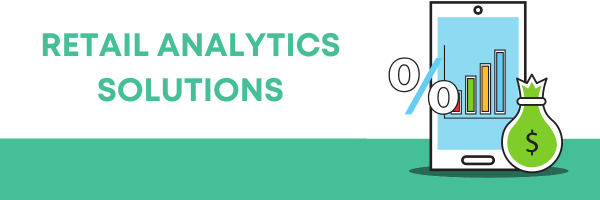
Retail Analytics Solutions: Unleashing the Potential of Data in the Retail Industry
In today’s fast-paced world, data has become a valuable asset for businesses across various industries, and the retail sector is no exception. Retailers are constantly striving to enhance customer experiences, optimize operations, and boost sales. To achieve these goals, they are turning to the power of retail analytics solutions, which harness the potential of data to provide valuable insights and drive informed decision-making.

Understanding Retail Analytics:
Retail analytics examines vast amounts of data generated by retail operations to uncover meaningful patterns, trends, and correlations. This data can come from multiple sources, including sales transactions, customer interactions, inventory records, and social media engagement. By analyzing this data, retail analytics solutions enable retailers to gain valuable insights into consumer behavior, market trends, and operational efficiency.
Enhancing Customer Experiences:
One of the key benefits of retail analytics is its ability to enhance customer experiences. By analyzing customer data, retailers can deeply understand their preferences, purchase history, and shopping patterns. Armed with this knowledge, retailers can personalize their marketing efforts, deliver targeted promotions, and offer tailored product recommendations. This level of personalization improves customer satisfaction and examines increases in the likelihood of repeat purchases, customer loyalty, and positive word-of-mouth.
Optimizing Inventory and Supply Chain Management:
Efficient inventory and supply chain management are crucial for the success of any retail business. Retail analytics play a pivotal role in optimizing these processes by providing retailers with real-time insights into inventory levels, demand forecasting, and supplier performance. By leveraging this data, retailers can ensure that they have the right products in stock at the right time, minimize stockouts, and reduce excess inventory. This optimization improves operational efficiency and results in cost savings and increased profitability.
Driving Sales and Revenue Growth:
Retail analytics also contribute significantly to driving sales and revenue growth. By analyzing sales data, retailers can identify top-selling products, understand sales trends, and determine the effectiveness of marketing campaigns. This information enables them to make data-driven decisions on pricing strategies, product assortments, and promotional activities. Additionally, by analyzing customer behavior, retailers can identify opportunities for upselling and cross-selling, further boosting sales and revenue.
Improving Store Performance:
In addition to optimizing customer experiences and driving sales growth, retail analytics can also help retailers improve store performance. By analyzing data on store operations, footfall patterns, and customer behavior, retailers can identify areas for improvement. For example, they can identify bottlenecks in store layouts, assess the effectiveness of visual merchandising, and optimize staffing levels based on customer traffic. By making data-driven decisions to enhance store performance, retailers can create a more seamless and enjoyable shopping experience for their customers.
The Future of Retail Analytics:
As technology continues to advance, the future of retail analytics holds even greater promise. With the advent of artificial intelligence and machine learning, these are becoming more sophisticated and capable of handling vast amounts of data in real time. This enables retailers to gain even deeper insights, predict consumer behavior, and automate decision-making processes.
Retail analytics solutions are transforming the retail industry by harnessing the power of data. By leveraging these solutions, retailers can enhance customer experiences, optimize inventory and supply chain management, drive sales and revenue growth, and improve store performance. As the field of retail analytics continues to evolve, it opens up new possibilities for retailers to make data-driven decisions and stay ahead in an increasingly competitive marketplace. Embracing the potential of retail analytics is not just an option but a necessity for retailers looking to thrive in the digital age.